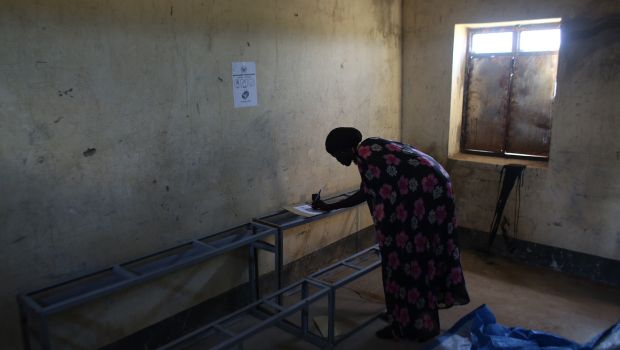
A woman votes in a polling station located in a school during a referendum in the town of Abyei October 28, 2013 (REUTERS/Goran Tomasevic)
Voting began despite the fact that both Sudan and South Sudan—along with the African Union’s (AU) Peace and Security Council—have refused to recognize the poll and say they will not accept its results, expected to be announced at the end of the month.
Dr. Luka Biong Deng, the official spokesman for the Abyei Referendum High Committee overseeing the poll, told Asharq Al-Awsat that voting began on Sunday morning, with 29 voting centers around Abyei.
Deng claimed that demand was extremely high for a referendum among the citizens of the territory, who he said had been waiting for a chance to vote for a hundred years.
Deng added that the referendum will be observed by international organizations—without disclosing their names—and civil society organizations, and said that local and international media were also present.
Al-Khair Al-Fahim, chairman of the Abyei Joint Oversight Committee (AJOC) on behalf of Sudan, told Asharq Al-Awsat that the referendum is invalid and he is not paying any attention to it.
“What is built on invalidity is invalid, as the governments of both Sudan and South Sudan have not recognized it [the referendum], [and neither have] the African Union and the UN Security Council,” he added.
He accused the architects of the referendum of “working on creating chaos and dragging the region towards war, despite the fact that both leaders, Omar Al-Bashir and Salva Kiir, agreed in a summit held in Juba on the formation of the area’s administration.”
Fahim said: “There is no referendum in the world without regional and international recognition, and this referendum is disregarded by all sides.”
He added that “the intention is to sabotage relations between Juba and Khartoum and create chaos,” indicating that his tribe, the Misseriya, which is currently in conflict with the Ngok Dinka, is capable of holding its own referendum. However, he said: “We have withheld because we do not want to advance a disaster in the region. We have asked the Misseriya not to be misled as a result of this chaos.”
In an official statement issued on Sunday, the African Union announced the government in Khartoum had prevented a delegation from the Peace and Security Council from visiting Abyei. A visit to the area was expected on October 22 and 23. The statement confirmed that the Peace and Security Council “expresses its deep disappointment and regret that it was unable to undertake the visit to Abyei . . . due to the insistence of Sudan that the visit be postponed for contrived security reasons.”
The area is currently guarded by Ethiopian forces, under a mandate issued by the UN Security Council two years ago under Chapter VII of the UN Charter.
The African Union’s statement reiterated its “deep concern” regarding the situation in Abyei, stressing “the need for active and continued African involvement.”
The status of Abyei—a region spanning approximately 4,000 square miles (10,500 square kilometers) located between Sudan and South Sudan—is one of the most contentious issues between the two governments and remains unresolved by the peace agreement concluded after the 2005 Sudanese civil war. The war eventually resulted in the establishment of the independent state of South Sudan in 2011.
According to Sudan’s official news agency, Sudanese Minister of Foreign Affairs Ali Karti issued a press statement saying that he considered the referendum a violation of the agreement between the two countries under the overarching authority of the African Union, though he did not believe the government of South Sudan was responsible.
He added that “this move undermines the decisions of the African Peace and Security Council, including the last meeting which took place in New York at the leadership level, representing a departure from the outcomes of the meetings between the two leaders.”
Karti said that the delay of the visit by the delegation from the Peace and Security Council was because the visit was scheduled at an unsuitable time, and that Sudan did not want it to coincide with “this unilateral move.”
“We wanted this visit to occur as far away from this disruption in the Abyei region,” he said, and added that Khartoum respected the decisions of the African Union.
